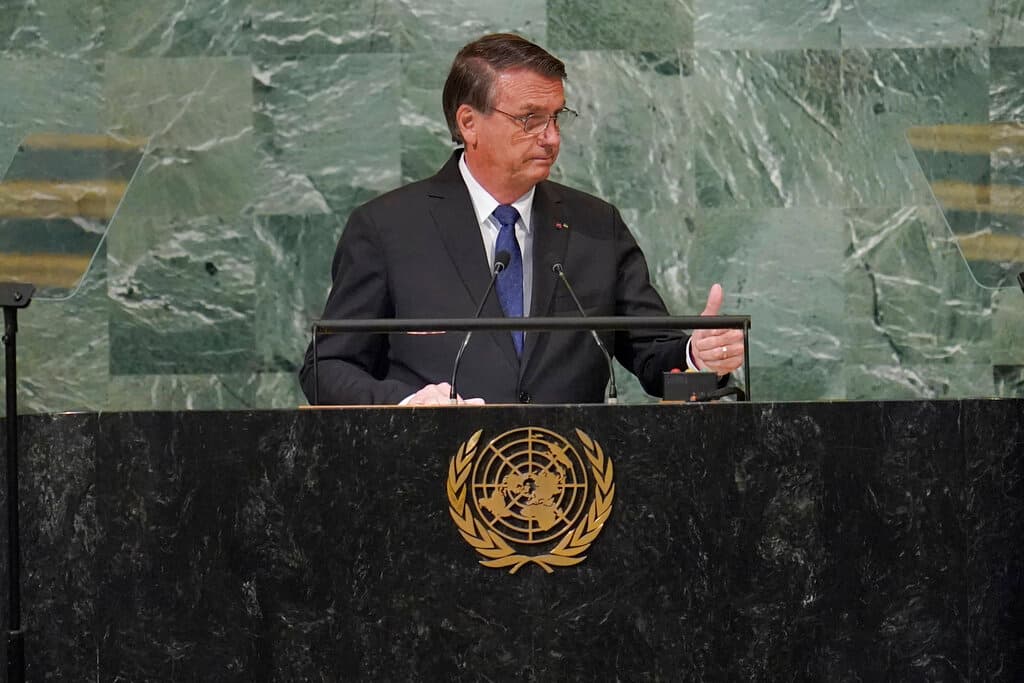With Bolsonaro on the Ropes, Brazil’s Election Takes a Violent Turn
With polls giving his opponent the edge, Bolsonaro is taking a page out of President Trump’s playbook by raising election integrity questions long before polls have even opened.

Brazilians on October 2 will vote in the first round of an increasingly violent campaign for president that could see the region’s last remaining right-wing government toppled.
The race is between the President Bolsonaro and a former president and factory worker, Luiz Inácio Lula da Silva, known as Lula.
With polls giving Mr. da Silva the advantage at the moment, Mr. Bolsonaro is taking a page out of President Trump’s playbook by raising election integrity questions long before polls have even opened.
Mr. Bolsonaro’s rhetoric has riled up his supporters to the point that the campaign is becoming deadlier by the day. Last week, a Bolsonaro sympathizer killed a follower of Lula’s party after a heated political argument in the state of Mato Grosso, according to local police.
The department that monitors political violence at the Federal University of Rio de Janeiro says that during the first six months of 2022, political violence in Brazil has claimed 40 lives. Messrs. Bolsonaro and da Silva now wear bullet-proof vests when they are in public.
Last week in Rio de Janeiro, a Lula sympathizer assaulted a conservative councilor candidate in the 2020 election, Rodrigo Duarte. In July, an assassination in the city of Foz do Iguaçu shook the country. The local treasurer of Lula’s Workers’ Party there reportedly was shot at a party by a man who cried “here is Bolsonaro” before pulling the trigger.
A professor of international relations at the Federal University of San Pablo, Regiane Nitsch Bressan, told the Sun that Mr. Bolsonaro has been inciting violence for the past four years by attacking the country’s democratic institutions.
In September 2021, during a speech at Brasilia, Mr. Bolsonaro attacked the Supreme Court by urging his followers to disobey the court’s decisions. Earlier this year, he accused two Supreme Court justices, Luis Roberto Barroso and Alexandre de Moraes, of being biased.
“Barroso and Alexandre de Moraes want Lula to be president,” Mr. Bolsonaro said in a television interview.
Mr. Bolsonaro has also spread doubts about the nation’s electronic voting system, which has been used for more than 25 years. He claims that the voting system “cannot give 100 percent guarantee of security.”
During a radio interview earlier this year, Mr. Bolsonaro said his party may not accept the election result unless the computer-based voting system is replaced by printed ballots.
“If this method continues, they’re going to have problems,” Mr. Bolsonaro warned. “Because one side — which is our side — may not accept the result.”
Ms. Nitsch Bressan said that Mr. Bolsonaro’s supporters are now starting to believe the president’s assertions that the electoral system is flawed. The country, she said, is nervous about whether Mr. Bolsonaro will accept the elections if he loses.
“Part of his voters are very violent people who have been goaded by his violent speech,” Ms. Nitsch Bressan said.
A professor of international relations at the Federal University of Santa Catarina, Clarissa Franzoi Dri, told the Sun that even though street violence has been a recurring problem in Brazil for years, political violence is fairly new. Mr. Bolsonaro, she said, has created a “fundamentalist” environment in which his supporters are expected to support him no matter what.
“He imposed that you only need to believe in some ideas, and if you believe in those, you are right,” Ms. Franzoi Dri told the Sun. “If your opponent believes in different ideas, he is wrong and you should hate him.”
Mr. da Silva was president of Brazil between 2003 and 2010, a period of strong economic growth. In 2017, he was convicted of money laundering in a case in which executives at the national oil company, Petrobras, were alleged to have accepted bribes from construction firms in return for awarding them contracts at inflated prices.
Last year, Brazil’s Supreme Court overturned the conviction, claiming that the judge who headed the investigation, Sergio Moro, was biased and did not give Mr. da Silva the right to a fair trial.
Mr. da Silva is facing Mr. Bolsonaro at a time when a “pink wave” is emerging in Latin America. Countries such as Colombia, Mexico, Argentina, and Chile now have left-wing presidents. If Mr. da Silva wins the election, all six of the region’s largest economies will be governed by elected left-wing presidents.
Ms. Franzoi Dri says that the loss of strength of the right in the region has affected Mr. Bolsonaro’s image in Brazil. “The fact that the right is not getting a lot of space in the region is weakening Bolsonaro’s image in Brazil,” Ms. Franzoi Dri said.
According to the Economist, Mr. da Silva likes to remind his followers how “happy” they were during his presidency. During his two terms, Mr. da Silva’s economy grew at a 4.5 percent annual rate, public debt was reduced by 20 percent, inflation slowed, and the minimum wage was increased. Under his presidency, around 20 million Brazilians escaped poverty.
Yet, the country’s situation is very different from when he first took office in 2003. Brazil’s public debt is now 78 percent of GDP, 18.4 percent of the population is under the poverty line, and the richest 10 percent makes 15 times more than the poorest 40 percent.
In an interview with the Economist, Mr. da Silva emphasized the importance of the government’s role in the economy, leaving Brazil’s critics uneasy.
“If the government doesn’t stimulate development, if the government doesn’t take the initiative, if the government doesn’t make credit available, things don’t get done,” Mr. da Silva told the Economist.
Critics fear that this approach may lead the country to the economic situation it faced in 2016. After 14 years with the Workers Party in power, Brazil ended with the worst recession on record, a corruption scandal, and the impeachment of Mr. da Silva’s handpicked successor, Dilma Rousseff.
At the annual United Nations General Assembly this week, Mr. Bolsonaro cited his achievements as president and reminded the world of the consequences of electing Mr. da Silva.
“Between 2003 and 2015, a period in which the left wing was in the presidency of Brazil, the indebtedness of Petrobras because of poor management, politically driven appointments, and favors and diversion of funds reached up to $170 billion,” Mr. Bolsonaro said.

